I have four girls working for me now, but always April is my favourite. I like her cheeky smile, her plump behind and her chattering, high-pitched giggle. She is young and fresh - like a new shoot after a rainstorm - not careworn and cynical like the other girls. For her I allow only appointments with respectable clients - office workers and businessmen. No streetwalking for April. I take extra special care of her. I make sure she goes to church every Sunday. I make sure she goes to school when she isn�t working. I always drive her to and from her appointments, and I do not charge her for this, like I do the other girls. And most importantly, I tell her to ask the men she goes with whether they go with other men also, or only girls. If they say yes, they go with other men, I tell her always to use a condom - even if the man does not want to. What more could a father do for his daughter?
I am earning quite well now. There are increasing numbers of tourists and businessmen coming to Lagos, and many of them want the company of a good African woman. My three street girls have regular beats in the business district, and April has her appointments. In a good week I can earn enough for food and bills and still have some left over. With my spare money I buy items to make our rooms more comfortable. Recently I have bought a fridge and a wide screen TV. No one else on our block has a wide screen TV. I also buy books for April to help with her schooling. Maths books, science books and an atlas of the world.
You would think that all this would make for a happy, contented home life, but it is not so. Recently April has begun to complain that I treat her �like a child�.
�You are a child� I tell her, �you are my child�.
She complains that I do not give her enough of the money that we earn, that she does not have enough clothes, that her schoolwork is boring, that we do not have a maid and that she has to do housework as well as her appointments. She says she wants her hair straightened and lightened �like an American woman�. Worst of all, she has begun to spend time with Lubabah, another one of my girls. Lubabah is not the sort of friend I want April to have. She is 19, three years older than April and she chews gum and curses. I think she may be a bad influence.
It is difficult for me because my wife, April�s mother, has passed away so there is no woman in the house to help me with April�s upbringing. Instead I talk to my sister, Fatimah, about the situation with April. She tells me that teenage girls are often like this, that I need to be patient and that eventually the real April, the polite and obedient girl of twelve months ago will return to me. I tell her that I am running out of patience, that sometimes April makes me so angry that I have to hit her. It is not a nice thing to do, to hit your own daughter, but she leaves me no choice. A father must be respected.
Fatimah suggests that I take April to see Chidi. This is a good idea I think. Chidi is an old friend of my fathers, a traditional healer and a seer. He is able to contact the spirits that reside in the natural world and to seek favours from them. I will ask him to perform a ceremony that will help to calm April�s temper, that will help to protect her from herself.
On the arranged day I pick April up at the Hotel Clinton, a three star venue which we sometimes use for April�s appointments.
�Any bleeding?� I ask.
�No father,� she says, �no bleeding�
I kiss her because I am happy to see my daughter safe and well again. She gives me the money we have earned. It is in US dollars, excellent. I put the dollars in my pocket and give April her tip in Naira, our own currency.
We drive out to Chidi�s one-storey house in the suburbs. His son Ade answers the door and takes us through to the living room. Chidi is older and smaller than I remember. The armchair he sits in seems ready to engulf him - but his eyes are sharp and keen. I take out some of the precious American dollars and hand them to Chidi, ensuring that April can see the transaction, can see how much I love her. Because he was a friend of my fathers Chidi objects: �No, this is too much,� but I wave away his complaint. Chidi asks April some questions, about her schooling and about what she likes to do in her spare time. She is hesitant with her answers and I have to tell her to speak up more than once, but at least she does not mention her work. We have agreed it is best we keep that between ourselves - some people don�t understand the costs involved in raising children. Chidi explains that he will perform a ceremony suitable for a teenage girl. It will transfer April�s soul to the spirit Soko, for safekeeping; it will return to her when she has a husband to look after her.
In preparation for the ritual Ade draws the curtains and places a small bowl of incense on a burner. Then he beats out a simple rhythm on a drum as Chidi entrances April. He uses no props, no unnecessary affectations, the enchantment works entirely through the power of his intellect. He chants out a simple incantation: �Spirits come, help the girl April.� The room becomes warm. Chidi continues with his chant. The curtains flutter even though the window is shut. Ade increases the tempo of his beat and Chidi chants louder: �Spirits come, bless us and our children.� He starts to dance as he chants - simple, rhythmical steps. April�s eyes have become glazed and stare blankly at nothing in particular. Ade increases the pace again and Chidi begins to spin on one leg. His shirt tail has become loose from its position in his trousers and it follows him round in uncoordinated jerks, like a toddler chasing a ball. Sweat beads his forehead and his eyes bulge menacingly. The room feels crowded, as though more people have entered, although there is still only the four of us present. Suddenly, Ade cuts the beat. In perfect unison Chidi stops dancing. Though still balanced on one leg he is dead still. He does not tremble or shake, his flesh has become rock.
A low moaning fills the room. It comes from Chidi�s mouth but it is clear that it originates in a place and time far away from here. It is full of heat and steam, of pain and words. It is the sound of a thousand warriors preparing for battle, of a thousand mothers giving birth. Chidi begins to shout in a language I do not recognise. Suddenly, he is moving again - running on the spot, bouncing up and down, arms in the air, fingers splayed. For one minute, two minutes, three minutes Chidi is running. When I arrived he was a frail old man, now he is a spring laden ball of energy. Such is the power of Juju. Eventually he stops his energetic jogging and places his hands gently on April�s cheeks. He whispers incantations in a mixture of English and Yoruba. There is a sense of the room gently lifting and floating, suspended in time and space. April faints away as the spirits do their work.
After the ceremony Chidi brings April round by splashing her face with cold water. She is unstable and complains of feeling sick. Ade has to bring a bucket for her to vomit into. Before we leave Chidi gives April a present, a small wooden monkey hung on a black string. �I have blessed it. It will bring you luck with money and help you make your way in the world.� April is pleased with the gift and immediately places it around her neck.
As we drive home I ask April �Are you pleased that I have done this for you?�
�I don�t know� she mumbles, �I suppose so.� I do not chastise her for her ungratefulness. I am trying to be patient.
It is two days later when I have the incident with the monkey. A real one, not the reproduction hung around April�s neck. I am driving home from a business meeting. I am not really concentrating, I am listening to my car�s engine to deduce how it is running. As I approach a bend there is a flash of movement in the corner of my left eye. Two small children with sticks are chasing a monkey. The animal is screeching out a high-pitched distress call. Suddenly, it veers onto the road. I have no time to brake, no time to swerve. I feel the impact as my front wheels hit the monkey.
The animal is left under the car. I can see it when I crouch down, it is on it�s side with it�s front paws held together at its face as if it is praying. Every so often it twitches violently. I am minded to drive on and leave the animal there to die, but something stops me. For some reason I think of April. She is fond of animals and I imagine her soft brown eyes filling with tears for the injured creature. I decide that at least I can put an end to it�s suffering. I reach under the car and pull it out by its� tail. In the strong sunlight I can see its� face. One eye is a milky orb - no pupil is visible. A trickle of blood runs from its� nose. It�s jaws are quivering. Looking in the boot of my car I select the largest wrench from my tools. Hunching over the monkey I raise the wrench above my head and close my eyes. I bring it down hard and fast. The blow makes a sound like a football hitting a blanket that has been hung out to dry. I open my eyes and see that the wrench has missed the monkeys head but is embedded in its� neck. It has pushed up loose skin to give the monkey an ugly but somehow comical double chin; but at least the twitching has stopped. The monkey is dead.
I remove the wrench from the animal�s neck. Bits of soft flesh are stuck in the adjustment mechanism and blood stains the metal jaws. I wipe it clean on some grass by the roadside - a feast for the ants. Raising the animal by its tail I carry it to the ditch on the far side of the road. It�s nearly severed head jiggles crazily, attached to the body by some thin, bloody sinew. At the junction in the distance the lights change from red to green, but there are no vehicles there to obey the command. I throw the dead animal into the ditch.
I continue the drive home, feeling a little nauseous from my encounter with the monkey. Entering our rooms I go to the fridge to get a cold Coca-Cola. But something is not right. The fridge is pulled away from the wall as if it has been moved. And then I see it; my money tin. It is lying open on the bare table having been removed from it�s cosy hiding place. It is empty. It�s all gone - the dollars, the euros, the naira, everything. There is a note next to it, scrawled in April�s still childish hand: �dear father, I have taken the money that you o me and gone to europ. do not be angry, I am trying to better myself. I will write to you when I am based. Your loving dauter, april.�
I am shocked. I sit at the table, my head in my hands, the violated money tin in front of me. How could she do this to me? How could she, after all have I done for her?
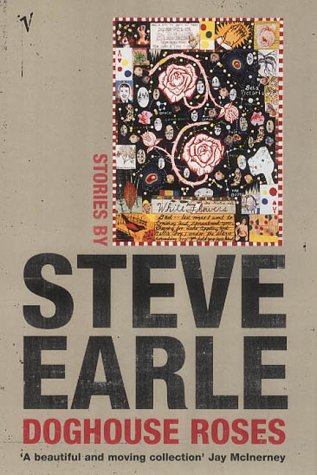 DOGHOUSE ROSES by Steve Earle
DOGHOUSE ROSES by Steve Earle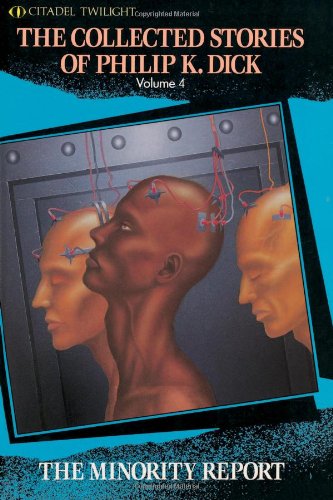 MINORITY REPORT: Volume Four Of The Collected Stories Of Philip K Dick
MINORITY REPORT: Volume Four Of The Collected Stories Of Philip K Dick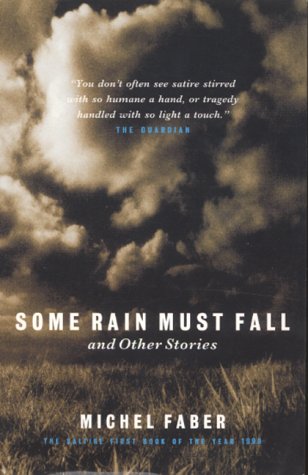 SOME RAIN MUST FALL by Michel Faber
SOME RAIN MUST FALL by Michel Faber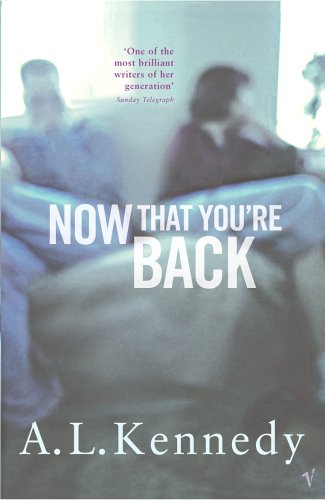 NOW THAT YOU'RE BACK By A.L. Kennedy
NOW THAT YOU'RE BACK By A.L. Kennedy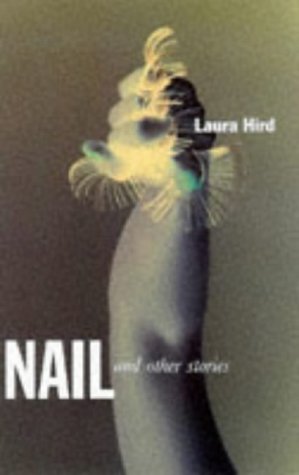 NAIL By Laura Hird
NAIL By Laura Hird